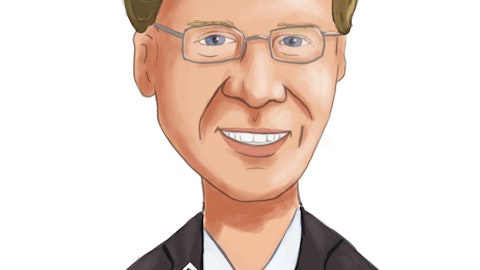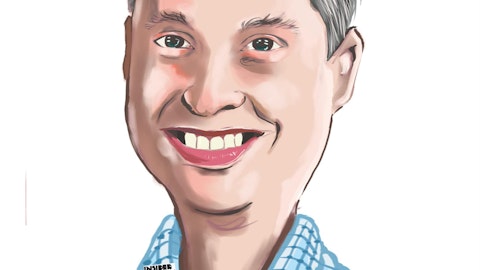Cameron Doerksen: Thanks, good afternoon. I wonder if you can just talk a little bit about the progress that you’re seeing with the air center business. You’ve sort of indicated a couple of new airline awards here. It sounds like you’ve got some kind of a new next-gen solution there. Just sort of talk about what the investments required, what kind of progress you’re making with customers on that new solution and where the business I guess has recovered to at this point?
Marc Parent: Well, look, the business is doing exactly what we thought it would do, maybe even slightly ahead at this very moment. Very, very happy what’s happening there. I also €“ and maybe I’ll let Sonya after talk about where we are investments, I would say it’s largely in-line with what we had anticipated when we announced the acquisition. Look, I’m very excited about this. And I’ll talk about it because we talked about what our ambitions were for what is an adjacent market for us. And this is playing out. This is playing out. You remember that we have an extremely large overlap of customers between our training and simulator business and this flight services business. And we’re seeing €“ we continue to see very, very high receptivity of our traditional customers to us being in this market.
And it comes at a time that we’re seeing €“ look, we’re seeing as airlines ramp up capacity now, it’s obviously very challenging times. And you can see from recent evidence that airlines in many cases, have really outgrown their technology infrastructure, and they need to reinvest €“ so you can be well assured that we’re engaged with all of our customers to help them as they shake their technology and needs of the future, you can be sure of that. So, I fully expect that we’re going to be part of the solution over time. And it’s not going to be a near-term P&L impact because at the moment, we’re focused on integration. And remember, in this, kind of business, it’s kind of like, I use a term like an ERP implementations take extended periods of time, but once you have them, you have them for an extended period of time as well.
So look, I’m very happy with . The next-gen solution is all about Software as a Service versus legacy on-premises. We have a pipeline. That pipeline is growing. It’s going to take time, but I’m very happy about how we’re progressing here.
Sonya Branco: Yes. I’ll just add on the investment part. So, to elaborate on, Marc, we’re seeing the ramp up. We’re seeing it flow through. That represents about 10% of Civil’s revenue this quarter. So, that’s very good. In terms of investments, we never laid out the exact amount, but it’s in the tens of millions, but €“ and has started since the acquisition and is part of the investments that you see through the results.
Cameron Doerksen: Okay. That’s great color. If I could squeeze in a second one, just quickly on the defense side. Now that Canada has formally signed a contract for the F-35. Can you update us on, I guess, what your expectation is for the training solution for that and how you think you’re positioned for that?
Marc Parent: Well, I think we’re well-positioned, obviously, because €“ I mean, that’s what we do. We do it around the world every single day. We talked about the, for example, signing F-35, that we won another F-16 contract recently. So, we know how to do this. We’ve done an F-18 and majority of fighters out there in the world. So, I could tell you, I personally and members of my team are in discussions with all levels of government in Canada and with the customers in the United States. We’ve met with the F-35 joint program office who provide management support for the F-35 program. And we’re confident that they’d be highly receptive to a proposal by Canada to embed additional training and simulation capacity in Canada’s domestic F-35 program.





